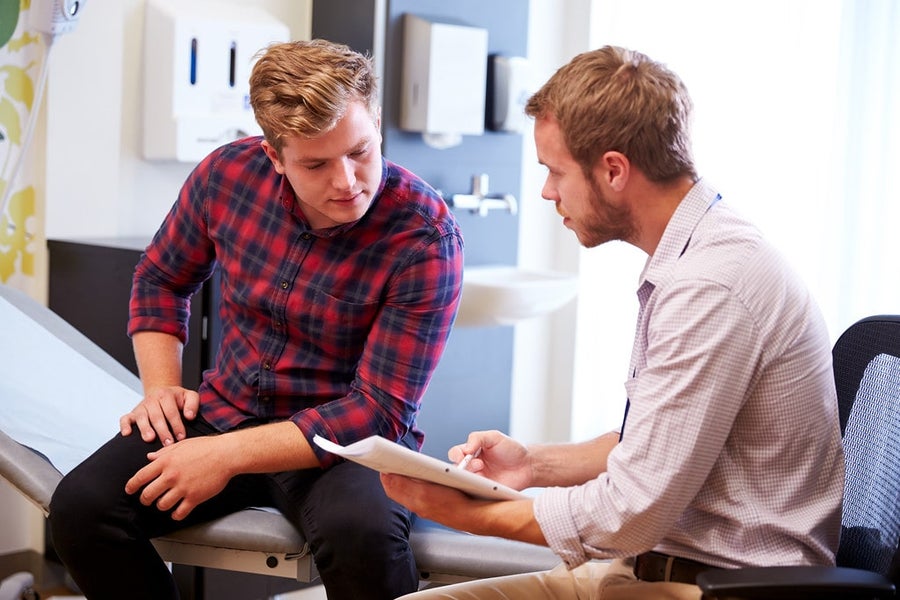Questions to ask your doctor
When you feel you need more information

Following a cancer diagnosis of cancer, you and your family are likely to have many questions.
When cancer is diagnosed you enter into a partnership with your doctor and other health care professionals. To help you get the best care you have the right to:
- ask questions
- be specifically informed about the details of your care
- make an informed choice of treatment from the options available to you.
It is important to ask questions, especially if you are unsure or unclear and feel you need more information.
Encourage your family to do the same. It is up to you how involved you want to be in making decisions about your treatment. This may change over time, so keep your doctor informed about your preferences.
For more information on your rights watch the video below on the Australian Charter of Healthcare Rights.
Talking to your doctor or nurse
To get the most out of your visit you might consider:
- requesting a longer appointment if you have a number of issues to discuss
- preparing your questions beforehand
- taking a friend or relative for support, or writing down answers to your questions if possible
- asking your doctor to explain again, if you don't understand the answers
- asking your doctor to give you a written summary of your treatment plan
- asking for an interpreter if you have difficulty communicating in English (contact the Translating and Interpreting Service on 13 14 50)
General questions
- What is the name of my cancer or condition?
- Is it slow or fast growing?
- Which part or parts of my body are affected?
- Is it possible to cure or control my cancer?
Questions about tests
- What will this test involve?
- What information will you get?
- What are the benefits and risks to me in having this test?
- Will the results of this test make any difference to the decision on what type of treatment I have?
- Do I have to pay for this test?
Questions about treatment and costs
- What is the aim of each treatment? Is it to cure, control, prevent spread, prevent recurrence or relieve symptoms?
- What difference will this treatment make to my quality of life, e.g. can I work, have sex?
- How much will treatment cost? How can the cost be reduced?
- Will I have out-of-pocket costs? If so, how much?
- Can I have a written estimate? Can this be itemised?
- If the costs change, when will you let me know?
- Can I be treated/see you as a public patient?
- Are there any other treatment options that are as effective but cost less?
- Do you participate in my private health insurer’s gap cover scheme and will you treat me under this arrangement?
- How will I be billed? When will I have to pay?
- Who else or what other services may be involved in my care? Will there be additional fees? If so, how can I get an estimate of their fees and find out more information about this?
- Who can I speak to about my financial situation?
- Are there programs that can provide financial assistance?
- Can I work while having treatment?
- Is telehealth available for any part of my care?
- What are the possible side effects of treatment? Can they be prevented or controlled? Are they temporary or permanent?
- Will the treatment affect my fertility/ability to have children?
- What if this treatment does not work?
- Are there any complementary therapies that I can have?
- I would like some time to make a decision. Will that make any difference?
- Who are the members of my treatment team?
- Are there any clinical trials suitable for me?
If your cancer is advanced
- What treatments are available to relieve my symptoms?
- Who will be responsible for my medical care?
- What help can my family and/or friends get if they care for me at home?
- How can I access palliative care?
Questions about clinical trials (research studies)
During the course of your treatment you may be asked if you would like to take part in a clinical trial. Questions to ask include:
- Are there any suitable clinical trials available?
- What would I have to do as part of the clinical trial?
- What are the possible side effects?
- What are the benefits and risks for me?
- Do I have the right to refuse?
- Can I withdraw from the clinical trial at any time?
- Are these studies important for me or others?
We're here to support all Australians affected by cancer
Explore our support and services
